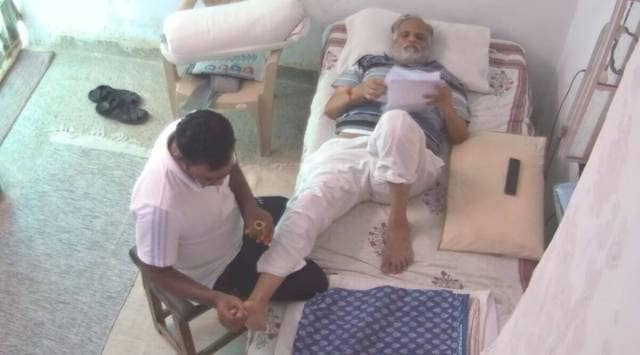Stay updated with the latest - Click here to follow us on Instagram
Delhi: Panel formed by L-G finds gaps and loopholes in jail management, suggests remedial steps
The committee constituted by Delhi Lieutenant Governor to look into the violations of jail rules by AAP minister Satyendar Jain and conman Sukesh Chandrashekhar has found gaps and loopholes in the management of prisons.
 A CCTV footage of Satyendar Jain getting a massage in Tihar Jail emerged earlier this month, followed by several other video clips. (CCTV video screengrab)
A CCTV footage of Satyendar Jain getting a massage in Tihar Jail emerged earlier this month, followed by several other video clips. (CCTV video screengrab) The three-member committee constituted by Delhi Lieutenant Governor V K Saxena to look into the violations of jail rules by AAP minister Satyendar Jain and conman Sukesh Chandrashekhar has found gaps and loopholes in the administration and management of prisons in the national capital.
The panel has also suggested remedial measures such as the installation of CCTV cameras and monitoring systems inside jail officials’ offices among others, said officials.
The committee, comprising the Principal Secretary (Home), Principal Secretary (Law), and Secretary (Vigilance) of GNCTD, had submitted its report to LG in the last week of November. It was formed following a court order after the Enforcement Directorate (ED) filed a complaint against the jail administration for providing special and preferential treatment to Satyendar Jain in Tihar jail. Purported videos of Jain getting a massage and eating food inside jail also went viral.
While Jain is in prison in connection with an alleged money laundering case, Sukesh Chandrashekhar is in Mandoli Jail on charges of alleged money laundering and duping several people.
The committee in its report suggested remedial measures that should be taken for the proper administration of jails as also requisitioned in the Terms of Reference (ToR). The panel also highlighted various malpractices it found inside the prisons, including “misuse of Jail account cards” of other prisoners by “financially sound and influential inmates”. It suggested that the Director General (Prison) may put in place a Standard Operating Procedure (SOP) and an effective biometric-based system to prevent such misuse and also curb the benami transactions in jail account cards, said officials.
The DG (Prisons) should put an effective SOP to stop “begaar” under which these “financially sound and influential inmates” use other inmates either forcibly or under some greed to do menial work for them. “This is in gross violation of the basic human rights of the inmates on one hand and also amounts to providing preferential treatment to influential inmates on the other. It is quite likely that corruption fuels it,” it said.
The committee also found that the prison has “dark spots” despite a large CCTV coverage system. “Certain areas which could be identified during inquiry are the offices of Jail Superintendent/Dy. Superintendent and his office complex. It is most likely that certain activities in violation of the norms of the Prison rules may occur or can be planned in the offices of the Jail Superintendent and his subordinates. The Prison complex is a secured place and access to the public is typically barred, unlike the case with other public offices,” it said.
The committee suggested that jail authorities should install cameras in the offices of the jail superintendents and other prison officers to bring transparency to the functioning of the jail administration.
The committee, however, said it does not recommend the installation of CCTV cameras in the offices of DG (Prison) and Assistant Inspector General (Prison) at the prison headquarters to prevent the intrusion into their privacy beyond a point. But it suggested that “suitable IT infrastructure may be put in place so that the DG (Prisons) is able to access the relevant feed(s) from other jail complexes (outside Tihar Jail) in Delhi remotely from his office to enable an effective supervision by him.”
It also suggested jail authorities come up with a suitable proposal for an arrangement for the appearance of undertrials in courts through video conferencing. Jail officials should also work on a plan to stop dangerous inmates from building contact with those outside to execute their plans. This will also reduce the deployment of human resources and material which, it said, is presently a hectic exercise for facilitating the physical appearance of the inmates before the court, it said in the report.
The committee also recommended plugging loopholes that were misused to provide entry to family members of some inmates and misuse of doctors’ advice to avail special facilities within the jail. It advised DG (Prisons) to review the system of medical facilities and suggest measures for an effective system of checks and balances.
While pointing out that smuggling of mobile phones and other contraband into jails is the real problem, the committee suggested DG (Prison) should organise a surprise for discrete raids by the district to executive magistrates with police aid so that there is a counter-check by a machinery which is not a part of the jail administration. Jail officials should also keep a close track of the calls being made by the prisoners to their family members and review them frequently and address the gap between demand and supply in this regard, it added.







